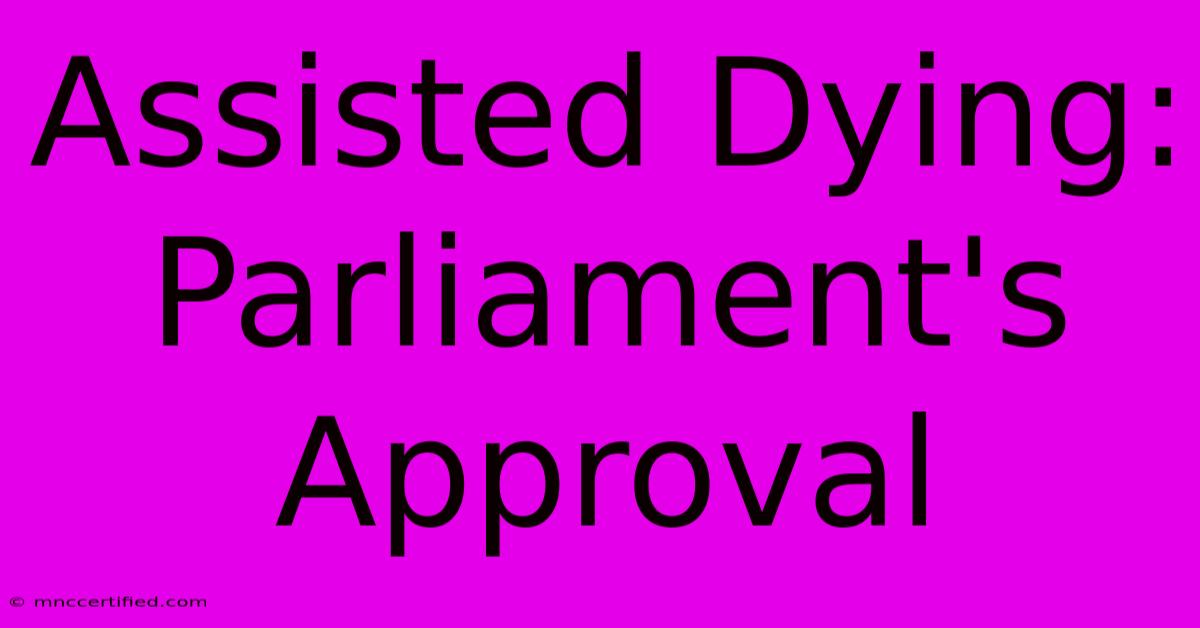Assisted Dying: Parliament's Approval

Table of Contents
Assisted Dying: Parliament's Approval – A Complex Issue Gains Traction
Assisted dying, also known as physician-assisted suicide or euthanasia, remains a deeply divisive and emotionally charged topic. Recent parliamentary discussions and potential approvals in various regions highlight the evolving global landscape surrounding this sensitive issue. This article delves into the complexities of Parliament's involvement, exploring the arguments for and against legalization, and examining the potential implications of approval.
The Arguments For Legalization: Compassion and Autonomy
Proponents of assisted dying legislation emphasize the importance of patient autonomy and compassionate care. They argue that individuals facing unbearable suffering, with incurable and terminal illnesses, should have the right to choose how and when they die, with dignity and control. Key arguments often include:
- Relief from unbearable suffering: For individuals experiencing intractable pain and suffering, even with palliative care, assisted dying offers a potential escape from prolonged agony.
- Maintaining autonomy and dignity: The right to self-determination is a cornerstone of many legal and ethical frameworks. Allowing individuals to choose the time and manner of their death respects their autonomy and preserves their dignity in their final moments.
- Reducing emotional burden on families: Witnessing a loved one suffer needlessly can be incredibly distressing for families. Legalized assisted dying can offer a measure of peace and closure.
- Protecting vulnerable individuals: Robust safeguards, such as stringent eligibility criteria, psychological evaluations, and multiple consultations, can be implemented to protect vulnerable individuals from coercion or exploitation.
The Arguments Against Legalization: Ethical and Moral Concerns
Opponents of assisted dying raise significant ethical and moral objections, focusing on the sanctity of life, potential for abuse, and the role of healthcare professionals. Central arguments against legalization include:
- The sanctity of life: Many religious and ethical perspectives hold that human life is inherently valuable and should be protected at all costs. Assisted dying, they argue, violates this fundamental principle.
- Potential for abuse and coercion: Concerns exist that vulnerable individuals, such as the elderly or those with disabilities, could be pressured into choosing assisted dying, even if they wouldn't otherwise choose it.
- The slippery slope argument: Opponents fear that legalizing assisted dying could lead to a gradual expansion of eligibility criteria, potentially endangering individuals who are not terminally ill.
- The role of healthcare professionals: Some argue that assisting in a patient's death contradicts the fundamental role of healthcare professionals, who are primarily tasked with preserving and protecting life.
Parliament's Role and the Path to Approval
Parliament's involvement in the assisted dying debate is crucial. The legislative process typically involves extensive debate, public consultations, and the careful consideration of various perspectives. Key steps often include:
- Introduction of legislation: A bill proposing changes to the law regarding assisted dying is introduced to Parliament.
- Committee stage: The bill is examined in detail by a parliamentary committee, which hears evidence from experts, stakeholders, and the public.
- Debate and amendments: The bill is debated in Parliament, with potential amendments proposed and voted upon.
- Final vote: The bill is put to a final vote in Parliament, determining whether it becomes law.
The Implications of Approval: Safeguards and Future Considerations
The implications of Parliament's approval of assisted dying legislation are far-reaching. If approved, robust safeguards are crucial to mitigate potential risks and ensure ethical and responsible implementation. These safeguards might include:
- Strict eligibility criteria: Clear and stringent criteria must be established to determine eligibility for assisted dying.
- Multiple medical consultations: Multiple independent medical professionals should assess the patient's condition and capacity to make informed decisions.
- Psychological evaluations: Psychological evaluations can help ensure that the patient's request is not influenced by depression or other mental health conditions.
- Independent oversight: An independent body should monitor the implementation of the law and investigate any potential cases of abuse or coercion.
The ongoing debate surrounding assisted dying reflects the complex interplay of ethical, moral, legal, and social considerations. Parliament's approval, or rejection, will have significant consequences, shaping the future of healthcare and end-of-life care. Continued discussion and careful consideration are vital to ensure a compassionate and ethically sound approach to this sensitive issue.
Off-Page SEO Considerations:
To further enhance the article's visibility, consider implementing the following off-page SEO strategies:
- Link building: Secure high-quality backlinks from reputable websites and organizations dealing with healthcare, ethics, and legal issues.
- Social media promotion: Share the article on relevant social media platforms, engaging with users and encouraging discussion.
- Guest posting: Write guest posts for other relevant blogs and websites, including links back to your article.
- Forum participation: Engage in online forums and discussions related to assisted dying, offering insightful comments and linking to your article when appropriate.
By combining on-page and off-page optimization, this article will be better positioned to rank highly in search engine results, providing valuable information to a wider audience.

Thank you for visiting our website wich cover about Assisted Dying: Parliament's Approval. We hope the information provided has been useful to you. Feel free to contact us if you have any questions or need further assistance. See you next time and dont miss to bookmark.
Featured Posts
-
Behr Concrete Bonding Primer
Nov 30, 2024
-
Cfp Contenders 3 Defining Games
Nov 30, 2024
-
Super 6 Picks Schwartzs Week 14 College Football
Nov 30, 2024
-
Suitors Circle Homebase M And S Kingfisher
Nov 30, 2024
-
Schwartzs Week 14 College Football Super 6
Nov 30, 2024